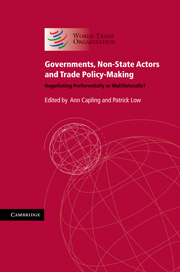Book contents
- Frontmatter
- Contents
- List of figures and tables
- List of contributors
- Acknowledgements
- Disclaimer
- Introduction
- 1 The domestic politics of trade policy-making: state and non-state actor interactions and forum choice
- 2 Chile
- 3 Colombia
- 4 Mexico
- 5 Indonesia
- 6 Thailand
- 7 Jordan
- 8 Kenya
- 9 South Africa
- 10 The influence of international non-state actors in multilateral and preferential trade agreements: a question of forum shopping?
- 11 Main findings and conclusions
- Index
- References
5 - Indonesia
Published online by Cambridge University Press: 05 July 2014
- Frontmatter
- Contents
- List of figures and tables
- List of contributors
- Acknowledgements
- Disclaimer
- Introduction
- 1 The domestic politics of trade policy-making: state and non-state actor interactions and forum choice
- 2 Chile
- 3 Colombia
- 4 Mexico
- 5 Indonesia
- 6 Thailand
- 7 Jordan
- 8 Kenya
- 9 South Africa
- 10 The influence of international non-state actors in multilateral and preferential trade agreements: a question of forum shopping?
- 11 Main findings and conclusions
- Index
- References
Summary
Introduction
The emergence of democracy in Indonesia as a result of the economic crisis in the late 1990s has brought significant changes to the policy-making process in the country. The reform advocates who emerged following the downfall of the authoritarian Suharto regime saw liberalization and engagement with the global economy as key to advancing economic reform in Indonesia. While recognizing the importance of concluding the global trade negotiations under the auspices of the World Trade Organization (WTO), Indonesia also remains committed to pursuing liberalization at the regional level through its membership of the Association of Southeast Asian Nations (ASEAN). Recently, Indonesia has also engaged in bilateral preferential trade agreements (PTAs), in part due to the stalling of the Doha Round negotiations, but also because the pursuit of PTAs by Indonesia’s immediate neighbours has generated fear among government and economic actors about the possible loss of competitiveness in key export markets.
The emergence of democracy and the increasing integration of the country into the international economy present the Indonesian government with a host of significant challenges in establishing an effective trade policy that reflects the wider interests of its domestic stakeholders. This chapter explores these challenges, focusing on two issues in particular: (i) the dynamics of the interactions between state and non-state actors (NSAs) in the country’s trade policy-making structure; and (ii) the relationship between these interactions and the question of forum choice – whether to negotiate preferentially or multilaterally. The chapter opens with a brief historical overview of Indonesia’s trade policy and trade patterns, before proceeding to an analysis of the institutional structure of trade policy-making and the state and non-state actors involved in trade policy-making. It then explores the way in which NSAs attempt to influence government and the question of forum choice. The final section concludes.
- Type
- Chapter
- Information
- Governments, Non-State Actors and Trade Policy-MakingNegotiating Preferentially or Multilaterally?, pp. 125 - 160Publisher: Cambridge University PressPrint publication year: 2010
References
- 3
- Cited by



